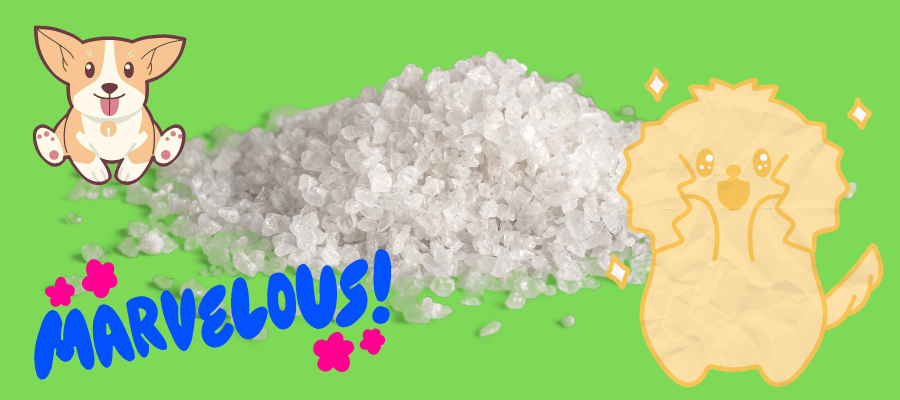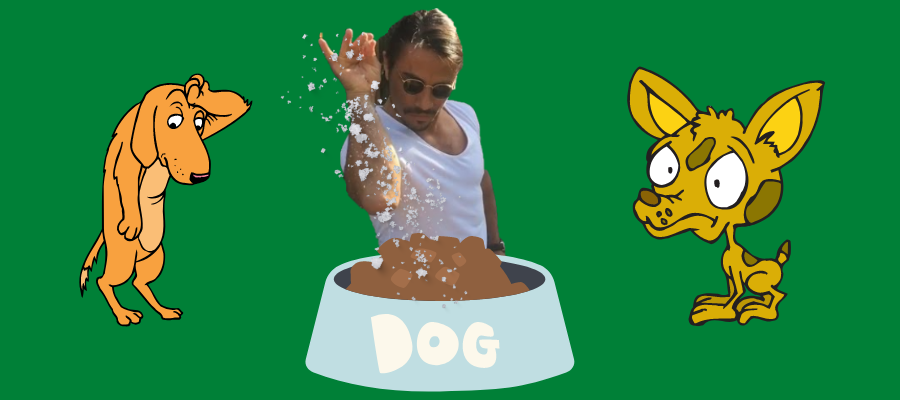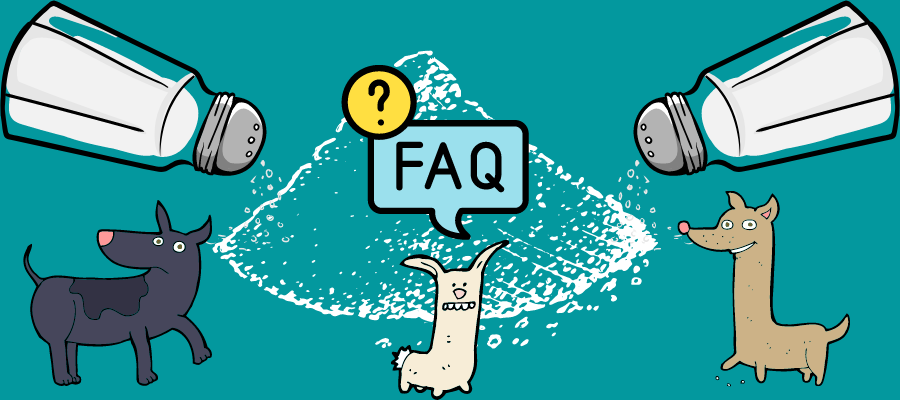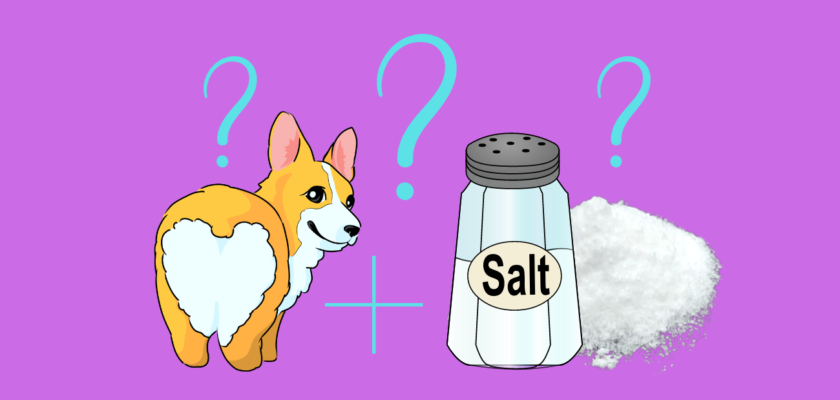Just like with people, too much salt can be dangerous for dogs. How much is too much, and can dogs eat salt in anything other than their main food?
Key Takeaways
- Dogs can eat salt, in moderation ✔️
- Salty, human snacks are not recommended for dogs ❌
- Salt poisoning symptoms include vomiting, diarrhea, tremors, and dehydration ⚠️
- If your dog occasionally licks salt, he should be fine ✔️
Can Dogs Eat Salt At All?

Most complete pet foods have some sodium chloride, or salt, added. It’s a common preservative that helps keep food fresh, and it can also enhance the flavor. Besides, sodium and chloride – the elements salt is made of – are necessary for your dog’s body. They help regulate fluid levels, support proper muscle function, and keep the heart working as it should.
In what amounts can dogs eat salt with their main food? The Association of American Feed Control Officials (AAFCO) says that for dogs, the minimum amount of sodium should be 0.3% in dry food. Most commercial dog food contains 0.25g – 1.5 g of salt per 100 g.
Can Dogs Get Salt Poisoning Not From Food?
When dogs eat too much salt at once, it results in salt poisoning, which can be fatal if not treated quickly. Symptoms include vomiting, diarrhea, excessive thirst and urination, weakness, seizures, and even death.
However, it likely won’t happen from eating human food. It’s usually caused by ingesting salt from inedible sources. Some of the biggest concerns are seawater and homemade play dough. Large amounts of salt are also found in paintballs, along with other toxins. Baking soda also contains sodium, and can give your dog sodium ion poisoning.
If your dog has a history of eating inedible things, it’s best to watch them closely in situations where the above items are involved. And if you’re taking your pup for a swim in the sea, and they swallow the water, give them fresh water to drink as soon as possible.
What to Do If You Suspect Salt Poisoning in Your Dog?
Okay, so your dog ate a large amount of salt in one sitting and you suspect a salt poisoning. What to do? First, don’t panic. Call a vet, ask for instructions. If your vet asks you to come to an animal emergency care, take a sample of what your dog ate with you. It will help to assess the amount of ingested salt and create a treatment plan.
Treatment for a salt poisoning usually includes giving them fluids to flush the salt out of their belly. Sometimes your dog will need to spend more time in a hospital, but if you act quickly, your pup will probably make a full recovery.
Long-Term Risks of Feeding Your Dog Salt

Can dogs eat salt in snacks? Salty treats probably won’t cause any immediate symptoms, but there are plenty of long-term risks to be aware of.
If your dog eats too much salt on a daily basis, it can lead to different health problems, including high blood pressure, congestive heart failure and dehydration. Dehydration can be especially dangerous for puppies and older dogs – if they are chronically dehydrated, it can lead to kidney or bladder stones.
So please, don’t feed your dog any salty treats like pretzels, chips or dinner leftovers. There are so many other ideas for healthy and dog-friendly treats (like freeze-dried liver or salmon). They are delicious for your dog, provide many nutrients, and won’t cause any harm.
Is It Safe for Dogs to Lick Rock Salt?
If you use rock salt to de-ice your driveway, sidewalk, or steps, there’s no need to worry about your dog licking it. Rock salt is a form of sodium chloride and is safe for dogs in moderation. Most dogs won’t like it enough to ingest too much, but if your pet has a history of eating questionable things, keep an eye on them just in case.
The Bottom Line
A little bit of salt eaten by your dog by accident probably won’t cause him any harm. But it doesn’t mean that you should share your salty snacks with him, even if he gives you those puppy eyes. Dog food which you give to your dog already contains the amount of sodium your pup needs, so you don’t have to worry about that.
If your dog ate a large amount of salt in one sitting, it can lead to salt poisoning. This situation requires a visit in a dog’s emergency care, so keep an eye on your dog when you are in the kitchen!
Can Dogs Eat Salt FAQs

So, can dogs eat salt? That depends. A little won’t hurt them, but too much is certainly dangerous. Do you have any other doubts? Then read through the frequently asked questions!
How Much Salt Is Safe for Dogs?
The recommended maximum safe dose of salt for dogs is around 1 gram per day from all sources other than their primary food. Dogs have a high affinity for salt and will consume as much as they can. This can lead to salt toxicity, which is caused by an excessive intake of sodium. Symptoms include vomiting, diarrhea, increased water consumption and urination, tremors, and seizures.
Will a Little Salt Hurt a Dog?
A little amount of salt probably won’t cause any harm to your dog (if he is healthy). Sodium is an important mineral in a dog’s diet, but they get enough of it from their regular dog food, so there’s no need to add salt to their bowl or (God forbid) share your chips with them.
Is It OK for Dogs to Lick Salt?
Yes, a little bit of salt is OK for dogs to lick, but it’s not advisable for them to do it on a daily basis, and you definitely don’t want them licking too much salt. Dogs love salty things because their taste buds are specifically tuned to detecting sodium, and sodium is essential for their health.
Why Does My Dog Want Salt?
Dogs need salt to regulate their body temperature and nerve functions, so if they want salt, it can mean that they have sodium deficiency. But it’s probably just the fact, that your dog like the taste of salt, (some dogs like to nibble on ice cubes or even lick the salt off of sidewalks).
Similar Posts:
- Can Dogs Eat Soy Sauce? What Is Salt Poisoning?
- Can Dogs Eat Doritos? The Problem with Dogs Eating Chips
- Can Dogs Eat Pizza or Pizza Crust Safely?
- Can Dogs Eat Pretzels? | Types Of Pretzels That Are Bad For Dogs
- Can Dogs Eat Ham? Is It Bad for Dogs? | Risks and Benefits
- Can Cats Eat Peanut Butter – How Much Is Safe for Them?
- Can Dogs Eat Pepperoni? Is It Too Bad for Dogs to Eat?
- Can Dogs Eat French Fries?

